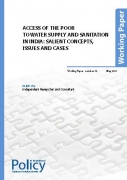/topics/conservation-reducing-water-usage
Conservation - Reducing Water Usage
ICID WatSave Awards 2011 - Invitation for nominations
Posted on 11 Jan, 2011 09:17 AMContent and Image Courtesy: International Commission on Irrigation and Drainage (ICID)
It is great pleasure to announce that ICID is inviting nominations for the WatSave Awards 2011 from individuals/ team working in the area of irrigation, drainage and flood management.
Conservation of urban lakes as potential sources of freshwater - Paper presented at the National Seminar on Water and Culture (2007)
Posted on 09 Jan, 2011 11:52 PMThe author sees the need for the conservation, maintenance and management of these ancient water bodies for the supply of water to cities. The author suggests that there is need to integrate traditional wisdom with modern water resource management.
Maharashtra Groundwater (Development and Management) Bill (2009)
Posted on 05 Jan, 2011 07:32 PMThe Maharashtra Groundwater (Development and Management) Bill, 2009 aims to facilitate and ensure sustainable and adequate supply of groundwater of prescribed quality, for various category of users, through supply and demand management measures, protecting public drinking water sources and to establish the State Groundwater Authority and District Level Authorities to manage and to regulate, with community participation, the exploitation of groundwater within the State of Maharashtra.
Civil society consultations for the 12th Five Year Plan Approach Paper: Urban & Rural WATSAN sector
Posted on 30 Dec, 2010 11:20 AMAt the request of the Planning Commission, Arghyam and WaterAid agreed to co-ordinate and support a process of civil society consultation for inputs on rural and urban domestic water and sanitation for generating recommendations for the Approach Paper to the 12th Five Year Plan of the Government of India.
A glimpse of the audience
Access of the poor to water supply and sanitation in India - Salient concepts, issues and cases by the International Policy Centre for Inclusive Growth
Posted on 20 Dec, 2010 10:04 PM This paper by the International Policy Centre for Inclusive Growth deals with access of the poor to water supply and sanitation in India. It argues that economic, technical, institutional as well as social factors constrain access to safe drinking water and proper sanitation in India for both the urban and rural poor, and that coverage figures do not reflect this restricted access. It finds that, increasingly, communities are being required to manage their own water and sanitation schemes, not just in rural areas but in urban ones as well.
This paper by the International Policy Centre for Inclusive Growth deals with access of the poor to water supply and sanitation in India. It argues that economic, technical, institutional as well as social factors constrain access to safe drinking water and proper sanitation in India for both the urban and rural poor, and that coverage figures do not reflect this restricted access. It finds that, increasingly, communities are being required to manage their own water and sanitation schemes, not just in rural areas but in urban ones as well.
The paper deals with domestic water supply and sanitation and presents a historical overview of the phenomenon in rural and urban India. This is followed by a critique of available figures for coverage which, it is contended, seem exaggerated because they do not account for the several constraints to access. It addresses the specific institutional problems faced in the public sector delivery of these two utilities in India apart from dealing with the parallel yet thus far limited presence of the private sector in these twin arenas.
Environmental compliance of hydel projects in Himachal Pradesh - Shukla committee report (2009)
Posted on 20 Dec, 2010 12:43 AMThe terms of reference for monitoring included the following:
Conceptual framework of South Asian water futures exchange - Commodity Vision
Posted on 18 Dec, 2010 12:15 AMIn this article published in Commodity Vision, the author presents the concept of the establishment of a 'futures market in water availability' in the context of the risk of water availability that Indian agriculture has been facing in the recent years.
With South Asian agriculture being dependent on the timely occurrence of the monsoons, any deviation from the scheduled arrival of the monsoon causes problems not only for the farmers, but also produces a threat to the food security of the region. However, the author argues that, there is no market in South Asia where users and investors exposed to water availability risk can effectively hedge against such a risk.
Water management across space and time in India – A working paper by the University of Bonn
Posted on 17 Dec, 2010 10:09 PMThis working paper by the University of Bonn attempts to give a spatial and temporal overview of water management in India. It traces how people and the successive regimes made choices across space and time from a wide range of water control and distribution technologies. The paper divides the water management in India into four periods –
- the traditional system of water management before colonial times;
- response from the colonial rulers to manage the complex socio-ecological system;
- large scale surface water development after independence; and
- finally, the small-scale community and market-led revolution.
Water conservation - A viable option to improve water availability - Solution Exchange paper
Posted on 11 Dec, 2010 12:16 PMThis paper from the recommended documentation section of the Solution Exchange for the Water Community Discussion Summary on the preparation of the strategic plan for rural drinking water by the Department of Drinking Water Supply, Ministry of Rural Development, is directed at stakeholders, planners, managers and consumers.
The paper argues on the importance of water conservation in the context of the increasing water shortages that the country has been facing in recent years because of expansion of irrigated areas and rapid industrialisation.
The article argues that water conservation practices need to be encouraged and improved through research, effective regulations, information dissemination and incentives to the end user and more emphasis needs to be placed on adequate coverage, quality monitoring and collection of field level data.
Peer Water Exchange (PWX) receives 2010 Intel Environment Award
Posted on 29 Nov, 2010 04:40 PM
The Peer Water Exchange (PWX) was awarded the 2010 Intel Environment Award today. PWX, a project of Blue Planet Network, is a combination of process, technology platform, and people designed to unlock the global capacity and creativity of individuals, philanthropies, businesses and implementers to solve the global safe drinking water and sanitation crises.






